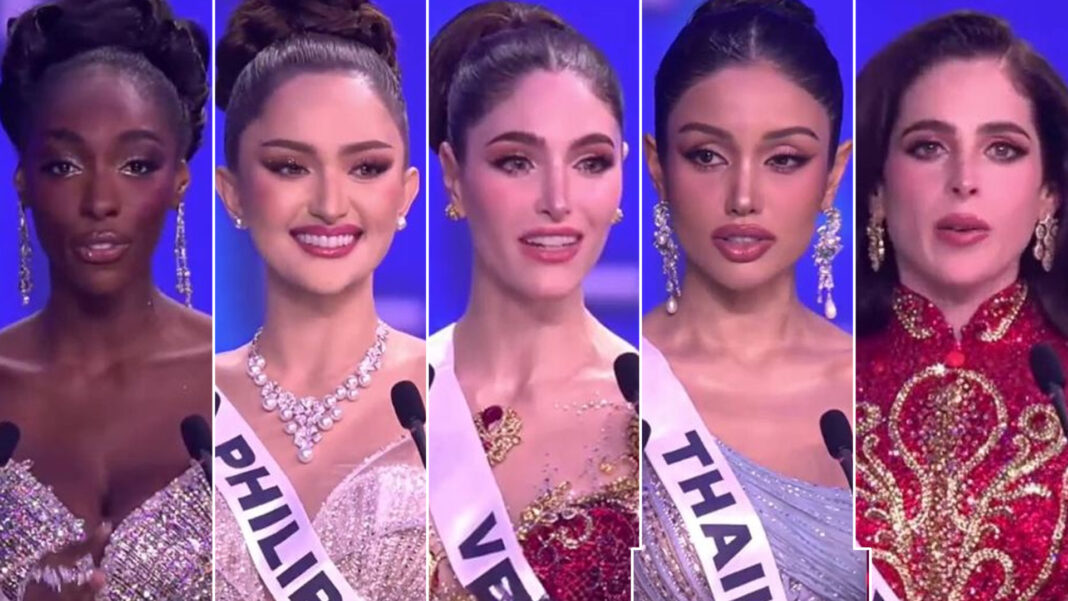We’re simply interested to see how AI evaluates the answers and who it believes deserves the crown based solely on their responses. The prompt is “Analyze their answers and rank them. Based on your assessment, who should win Miss Universe purely on the strength of their responses?
1. Overall Analysis Approach
Each candidate is evaluated on four factors:
Substance (clarity and depth of the message), Structure (organization and coherence), Authenticity (emotional honesty and relatability), and Impact (strength of advocacy and suitability for a global ambassador role). This mirrors what Miss Universe judges usually look for. The goal is not who has the “prettiest” answer but who shows the strongest ability to lead, communicate, and inspire.
2. Candidate-by-Candidate Analysis
Miss Philippines – Ahtisa Manalo
Her answers stand out because they are deeply personal and grounded in lived experience. She starts from a place of vulnerability, sharing her journey from poverty and using pageants to survive, which makes the message instantly authentic and relatable to global audiences. She frames “hope” as her contribution to humanity, and while that sounds simple, she reinforces it through her own story of persistence and hardship. This transforms a basic concept into something credible. Her final answer is also extremely strong because she clearly names an existing initiative (Alon Akademie), explains what it does, and shows how the Miss Universe platform can scale it. This shows preparedness, genuine advocacy, and operational clarity. Her structure is natural, emotional, and coherent — and she avoids clichés by using personal examples, making her message more powerful.
Miss Mexico – Fátima Bosch
Her answers are elegant, polished, and inspiring, but also general. She represents the classic Miss Universe tone: uplifting, confident, and poised. She emphasizes authenticity, bravery, and self-belief — themes that are easy to connect with. However, both answers lean toward motivational rather than concrete commitments. There is no clear project, no defined advocacy, and no personal narrative to support her message. While she speaks beautifully, her answers sound more like short quotes than a full message. They are strong in tone but weaker in substance when compared to others who offered more depth and context.
Miss Thailand – Praveenar Singh
Her answers have heart, but they feel reheated and generic. “Women equality” is an important issue, but her explanation remains surface-level, mostly repeating the concept without giving new insight. Her language is inspiring but repetitive. In the final question, she offers a message about rising from struggles and being your own hero — good, but again not anchored in any concrete action. She performs well emotionally but lacks nuanced storytelling and a programmatic vision.
Miss Venezuela – Stephany Abasali
She provides an interesting angle by highlighting global experience and empathy across cultures. Her answer has strong substance because it discusses communication, language barriers, and broad exposure. She positions herself as someone who understands multicultural environments. However, her delivery is slightly scattered, with long, winding sentences that weaken clarity. In the final round, she emphasizes education and communication but uses abstract concepts, and her answer feels less focused than the others. Strong content, weaker execution.
Miss Côte d’Ivoire – Olivia Yace
Her answers focus on self-love, identity, and emotional confidence. She has a powerful personal brand: “Assume your identity,” which is memorable and advocacy-ready. This gives her a unique selling point. Her final answer is also strong, highlighting representation, cultural fusion, and unapologetic leadership. She communicates well and has clear messaging, though she does not fully articulate a concrete plan or specific initiative. Still, her answers are poetic, culturally resonant, and empowering.
3. Ranking Based on Q&A Performance Alone
1. Miss Philippines – Ahtisa Manalo
She provided the strongest combination of authenticity, depth, clarity, emotional resonance, and actionable advocacy. Her personal story elevates her answers beyond generic inspirational lines. She also demonstrates real-world work through an organization, which aligns perfectly with Miss Universe’s push for purpose-driven winners.
2. Miss Côte d’Ivoire – Olivia Yace
A strong, memorable communicator with a unique and culturally rich message. She stands out for charisma, identity-centered advocacy, and confidence. Slightly less detailed than Ahtisa, but very powerful in presence and message.
3. Miss Mexico – Fátima Bosch
Poised, elegant, and inspiring, but her answers feel too general and more slogan-like than operational. Still, her articulation is excellent, and her tone is quintessentially “Miss Universe.”
4. Miss Venezuela – Stephany Abasali
Good substance but weaker structure. Her ideas about multicultural empathy are strong, but her delivery lacked focus, which lowers clarity and impact.
5. Miss Thailand – Praveenar Singh
Kind and genuinely inspiring, but her answers lack depth and rely heavily on broad concepts repeated without further development.
Based purely on Q&A quality, Miss Philippines delivered the strongest overall performance. Her answers are complete, emotionally grounded, advocacy-focused, and aligned with what Miss Universe increasingly values: a credible leader with a real story, real work, and real purpose.


